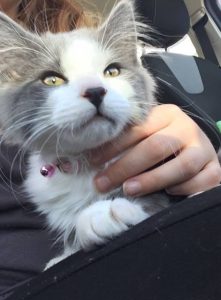Welcome to my blog! I am a third year student currently living in a small town in the Kootenays. (That’s 10 hours East of Vancouver, or 4 hours East of Kelowna, for those of you who don’t know your BC Geography!) I am majoring in Cultural Studies and English. After graduating with a Bachelor Of Arts degree, I then plan on going to a teacher education program and would like to become an elementary school teacher.
In my free time, when I’m not busy with school work and my job, I enjoy reading, cooking, yoga, tea, cats, travelling, and spending time with my friends, family, and pets!
I am taking this course, because I believe it will be interesting, as I took a previous Canadian Literature course, which I really enjoyed. Plus it’s nice to learn more on topics about your own country. I believe that this course will be useful to me once I become a teacher. I also really like the blogging aspect. I think it’s a really creative idea, because in most online courses there are just discussion posts and there is something about blogging I find that is really fun and allows you to really open up!
I expect that in this Canadian literature course, we will be focusing particular attention to Indigenous people and the effects colonialism had and, in some instances, still has on their lives. In the early times of colonialism in Canada there have been lots of incidents of violence and racism, and it’s good that now much of current Canadian literature covers these topics. I hope we might also cover topics, such as Canadian identity and who we are as a country.
I’ll end this blog post with a cute photo of my new kitten named Twilah, who I adopted from the SPCA on Saturday! 🙂

My own image
I hope to get a lot out of this course, and I am really excited to get to know all of you!
Works cited:
Marc St-Pierre in collaboration with the Aboriginal Perspectives team. Aboriginal Perspectives. National Film Board of Canada. http://www3.nfb.ca/enclasse/doclens/visau/index.php?mode=theme&language=english&theme=30662&film=&excerpt=&submode=about&expmode=2 Accessed 12 Sep. 2016
Molson Brewery. “I am Canadian.” YouTube, uploaded by Vinko, 12 Sep. 2016, https://www.youtube.com/watch?v=BRI-A3vakVg.

Hey Danielle!
Your kitten is adorable – what breed is she, and are those mostly golden eyes? How do you pronounce Twilah, out of curiosity?
The video was a pretty accurate and interesting summary of what being Canadian (in general) is like. The part “diversity, not assimilation,” I suppose could refer to the salad bowl concept – a coming together of all cultures, than the melting bowl – traditional approach/an integration or assimilation into the majority/host culture. I believe I was taught 1-2 years ago that America was like a melting pot, but I wouldn’t know if such ‘evidence’ or so exists today as both countries are similarly multicultural now? I wonder what exactly distinguishes assimilation and diversity between Canada and other Western and multicultural countries like America. I only know that when I went to an American high school, they also require a foreign language in high school and whatnot so I would think it has more to do with social and governmental aspects perhaps?
Hey Jenny!
Thanks for the comment! Twilah is a ragdoll mix, and yes, her eyes are mostly golden. Her name is pronounced like “Tyla”, but with a “w.”
I agree that Canada as well as America are like a melting pot!
Hey Danielle,
You mention that you expect this course to focus on how colonialism had/has an affect on the lives of Indigenous people…I’m going to challenge your choice in wording (in a respectful way, as I would do with a friend) in that sentence however. You say “…still has on their lives.” How does the use of the word “their” make that sentence problematic? What do you imply by creating an us/them dialogue? Also, let’s not forget that colonialism is not exclusive to the lives of Indigenous people and instead, has resulted in an overall systemic problem of violence and racism. Lastly, I expect that topics such as Canadian identity and who we are as a country will actually be a very integral part of the conversations around Canada’s relationship with Indigenous people. Looking forward to chatting more during the course. Your new cat is adorable!
Brooklyn
Hey Brooklyn,
Thanks for the constructive criticism. I really didn’t mean “their lives” in an offensive way. I could say “the lives of Indigenous people” like you said, but how is that not different from saying “their lives?” The only thing different in those two sentences is in one sentence I say “Indigenous people” and in the other I say “their,” but since I was already talking about Indigenous people, I figured people would know what I mean. How would you word that sentence in a way that you deem less offensive? And I say that and ask that in a curious way – I am really sorry if I have insulted you or anyone else. You’re right that colonialism is not exclusive to the lives of Indigenous people, but it has been a huge part of the lives of Indigenous people. And thank you for the compliment on my new cat. She is adorable!
Hello Daniel;
Welcome to our course of studies and thank you for your introduction. I am looking forward to working together and learning from your perspectives. Enjoy.
Thank you for the comment! I look forward to working together and learning as well!